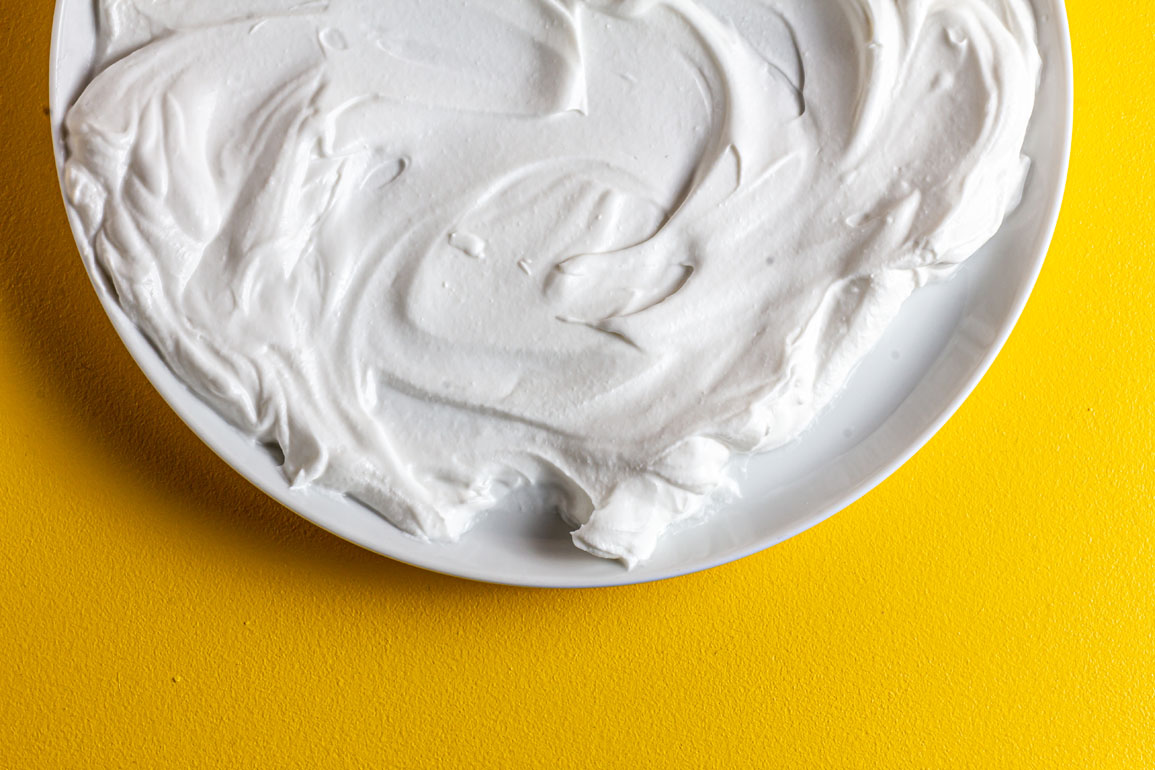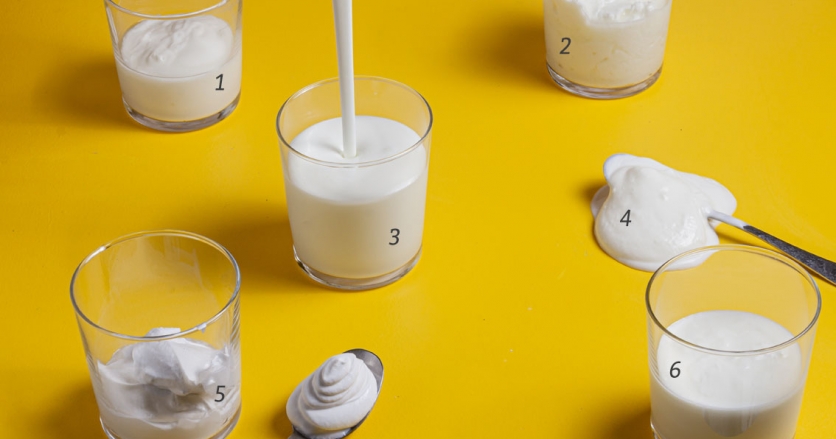Local Yogurt: An Embarrassment of Riches
In a few short years, Jade Herrmann has gone from hacking coconuts open with a machete to lining the fridges of local grocery stores and online retailers. Now the owner of Yoggu! she’s looking beyond the province to accommodate a demand for coconut yogurt. Why? More consumers are looking for alternatives to conventional yogurt.
“I’ve had people reach out and tell me that they are not vegan, but they think it’s better than dairy yogurt,” Herrmann says. “For me, that is a big win because when I started the business it was more to get into the vegan market, but I’m seeing people who are maybe more vegan- curious [and] also people who are just wanting a tasty yogurt option.”
Yoggu! is the product of Herrmann’s dissatisfaction with alter- native-to-dairy yogurts. A vegetarian since she was 13 years old, Herrmann had never found a suitable replacement for yogurt, so as an adult, she started to make her own. She’d head down to her local Asian grocer, buy up all their coconuts and hack them open one by one for the fresh coconut meat, which serves as the basis for the coconut cream used in her yogurts.
Eventually, Herrmann put the knife down and found a source for raw young Thai coconut, which helped her free up time to develop new flavours, including vanilla, mango, strawberry and plain. She began to build a presence through small stores and farmers’ markets, eventually working her way into major chains.
In the last year, Herrmann has learned she has a broader consumer base than she had thought. However, a significant barrier between her and new customers was accessibility. Even though she had managed to lower the cost significantly, it was still above the $10 mark for 500ml, which priced out many shoppers. So, she slightly altered the recipe to include coconut, agar and bacterial cultures for fermentation.
“It was scary to change the product, because so many people have become diehard fans,” Herrmann says. “Some were alarmed, but I really took it as an opportunity to educate them on why, because at the end of the day, it just wasn’t feasible to do what we were doing on a larger scale, and so many people couldn’t afford the product, and, ultimately, I didn’t want that.”
Herrmann’s success in B.C. has her looking beyond our borders, and she’s looking to launch nationally in 2021. It’s an expansion she never predicted.
“Initially, I thought it would just be a B.C.-based brand, but as it’s grown I’ve realized it is possible to make more of this product on a bigger scale, and people want it,” Herrmann says.
Part of the rise in popularity for products such as Herrmann’s Yoggu! is the increase in consciousness about probiotics or the “friendly” bacteria that live in the small intestine and help facilitate a healthy digestive system. Some studies have even linked healthy or unhealthy gut bacteria with mental health. It’s argued that many of the food additives — the things you can’t pronounce on the nutrition label — and environmental conditions such as stress, are causing health problems, everything from irritable bowel syndrome to inflammation.
Many cultures worldwide consume fermented foods rich in probiotics — kefir, kimchi and sauerkraut — with most meals. In North America, this tradition has been all but lost in recent generations. However, the new understanding of probiotics’ effect on gut health has seen a surge in fermented foods’ popularity, including yogurt.
1. Donia Farms’ heritage yogurt is made with non-separated whole milk from grass-fed cows. — doniafarms.com
2. In Courtney, B.C., McClintock’s Farm balkan-style thick yogurt is made with grass-fed water buffalo milk. — mcclintocksfarm.ca
3. Containing just two ingredients, goat milk and bacterial culture, Goat’s Pride yogurt varies in consistency — kefir-like in the summer and thicker in the winter. — goatspride.com
4. The Farm House Natural Cheese’s yogurt uses dairy from their herd of Guernsey and Brown Swiss cows and four strains of benefitial lactic bacteria. — farmhousecheese.com
5. Yoggu! is made with organic coconut cream, agar and vegan probiotic cultures. — yoggu.ca
6. Tree Island’s cream-on- the-top yogurt is made with 100 percent B.C. grassfed dairy and is available in a range of flavours, including orange blossom and cardamom and coconut lime— treeislandyogurt.com
Keeping the ingredient list short
While many big brand yogurts promote their yogurts’ probiotic content, they are often full of additives such as sugar, milk powder, calcium phosphate, artificial sweeteners and whey powder.
For Merissa Myles, owner of Tree Island Gourmet Yogurt, those are a few ingredients too many.
Myles and her husband, Scott DiGuistini, always wanted to have their own family business. Myles has a background in community economic development, and DiGuistini is a microbiologist. The two were researching fungi and algae to start a supplement company. However, a trip to France set them on a new course.
“We were eating yogurt, and it was so fresh and had a direct relationship with the farms it was from,” Myles says. “There’s an aspect of traceability in France that isn’t in B.C. or Canada. Here, you go to the store and see the big brands, and you don’t know where it comes from.”
Myles and DiGuistini launched Tree Island Yogurt in 2012 with the mission to only using locally sourced grass-fed dairy and ethically sourced ingredients. They also remove the whey to make for a smoother texture and use bacterial cultures that give it a creamy, rather than tangy, flavour. They also focus on offering yogurts with lower sugar content than conventional yogurts and unique flavours such as chai latte, orange blossom and cardamom, and coconut lime.
“The main thing is that we wanted to make real food that tastes real and supports Canadian farmers,” Myles says. “The global market for fruit and stuff like that is quite competitive and having traceability is difficult, but we measure our success on the ripple effect of our business in our community and across the country.”
Get your goat
For many, consuming cow dairy is not an option. However, some dairy-sensitive people can tolerate goat’s milk as an alternative. Jo-Ann Dykstra and husband Peter have owned Goat’s Pride Dairy, based in Abbotsford, since they got their first goat in 1989.
It was a gift from Jo-Ann’s father. The young couple had just moved to the country with their small children when her father went on vacation, leaving his goats in her care. Upon returning, he gifted her with a kid — or baby goat. That one goat turned into three, then six and now the Dykstras have a herd of 100 goats.
“Someone came to our door and said that there was a demand for goat milk in the area and that they were interested in buying our milk,” Dykstra says. “For many years, we shipped our milk to Avalon, and that was the impetus for us to start our own goat- milk company.”
Eventually, Avalon began to bottle a portion of the goat milk for the Dykstras under the Goat’s Pride label and from there, the company grew.
Goat milk is often more comfortable to digest, not because of the lactose content — goat milk is not lactose-free — but because of the fat and protein composition.
“It’s actually easier for children to digest, but not just human babies, but also animals like cats and dogs,” Dykstra says. “Even people from the film industry have come by to pick up milk for different animals like wolves and skunks.”
Goat’s Pride yogurt is also thinner than conventional yogurt, almost kefir-like, due to the absence of thickening agents. The fat content of the milk and the consistency of the yogurt changes based on the season. In summer, the yogurts are thinner because the goats are more active, while in the winter, the goats are less active, and the yogurt is thicker — just as nature intended.
The Dykstras have always maintained organic farming practices with their goats. However, like many small producers in recent years, they gave up on being certified organic due to cost, paperwork and restrictions.
“We have to be farming. We can’t be paper-trailing,” says Dykstra, noting that farming is a round-the-clock job when you’re taking care of escape artists.
“People have no idea how much more work grass-fed goats are to have, because they are notorious for escaping,” Dykstra says. “They stand on the wire and push down the pole. To be honest, it’s a lot less work to have them inside, but I don’t think the quality of the product is as good, and the animals don’t have as good of a life.”
Now, the Dysktras live on a larger property with their own processing plant. Their daughters are beginning to take over operations and care for the goats, and their son runs his own company, Mt. Lehman Cheese Co., out of the same facility. He also produces water-buffalo milk products for Tesfa Farms. Meanwhile, Goat’s Pride remains a milk and yogurt company only, with a small shop at the house.
The next generation of Dykstras is continuing the goat farm’s 30-year legacy. Not bad for a family that was handed a goat as a gift.





